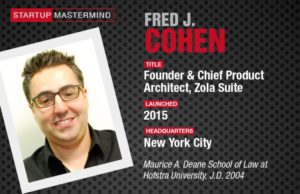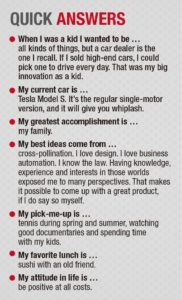
image AttorneyAtWork.com
Technology enthusiast Fred J. Cohen took a detour from tech opportunities to study the law and then practice for a few years. Instead of settling for the practice management and marketing tools he had, Fred dreamed of ways to make them better. It’s the quest for the better mousetrap that led him to start a legal marketing and website company — and launch Zola Suite practice management software.
Productivity Habits
What’s the first thing you do after waking up?
I pin down three things I want to accomplish that day. That’s my “hell or high water” list. I’m a big list person.
Where do you like to work?
Not at home. God bless them, I have kids and they’re a massive distraction. I have my own office, but I rarely use it. I sit in the trenches with our development team. That being said, I don’t like to sit in one spot. I’ll sit in a Starbucks for an hour or two and sometimes go to a conference room to be in solitude.
How do you handle email?
If it’s a quick answer, I get it out of the way. I use a service called SaneBox.com. It doesn’t fight spam. It flags stuff you don’t really need but might want to skim through to keep informed. It helps keep my inbox from getting as full as it would otherwise be. I also convert certain emails to tasks.
So you use a plug-in for Outlook?
No. We have built a complete email client into Zola Suite, which also has a robust task management system. With a single click, it converts an email into a task and gives you additional abilities, like setting reminders via email or making them recur. You can add checklists to tasks, and you can add project contacts to it.
Zola Suite has a lot of neat matter-centric capabilities, too. For example, it can automatically create a time entry from an email you draft. If you want to address a person related to a matter, you select the matter and it brings up all matter-related contacts. It significantly reduces the chances of addressing the wrong party. Also, it automatically files the email under the matter.
I guess your favorite productivity tool is Zola Suite.
We use it internally, even though it was designed for law practices. Its ability to attract other verticals is not lost on us.
Are you a fan of Getting Things Done (GTD)?
I give talks on GTD. Our task management system is GTD-inspired.
What’s the one habit you wish you could kick?
Getting my hands into too many things. I have a spectacular team and I let them run with things more, but I still get into details of many things I probably shouldn’t as CEO.
What do you let slide?
If people try their best and the outcome isn’t good, I don’t like to castigate them for that. I don’t want people to be worried about the consequences of decisions and only do safe things that don’t propel us forward as an enterprise.
What’s the best advice you’ve ever received?
Michael Gerber’s “The E-Myth” has been a big influence in terms of the way I view business more than anything else — in managing the company, and what a product accomplishes. The book begins by talking about McDonald’s, about how its ketchup dispensers put the right amount of ketchup perfectly centered on the burger so you don’t have to rely on the discretion of a particular employee to make the right decision. It’s about creating tools that empower everyone at the company to consistently deliver better products and services. Our email client was substantially influenced by “The EMyth.” It allows users to autobill and autofile. You don’t want to create an enterprise where you rely on individuals’ discretion to perform routine tasks.

image AttorneyAtWork.com
A Deeper Dive into Zola Suite’s Start
Tell us about your decision to leave the law and start a technology company.
The practice of law was a detour for me. I was a techie as a teenager. I had started a company building high-end PCs in my late teens. It morphed into a company that built high-end workstations for defense contractors, universities, obsessive gamers. I sold that company to a publicly traded company in California when I graduated law school. Then I practiced law, but I’ve always had a passion for tech, art and design.
I practiced law from 2006 to 2010 — it overlapped with the first few years after I founded Zola Media, a marketing company for law firms. It has its own robust CMS we developed to help law firms manage their marketing and websites.
I started phasing out my practice around 2008, but in early 2012, I was still practicing part-time (hard to say no to long-term clients.)
I tried a bunch of practice management applications while practicing, and I wanted to build the better mousetrap. I knew it would be hard. Enterprise software is hard. It has a million lines of code, it’s mission-critical. I wanted to implement “E-Myth-like” systems in practice management and a beautiful user interface. I daydreamed about this.
When was Zola Suite conceived?
We started developing Zola Suite in 2010 and we launched in 2015.
How did you come up with the name?
My father had told me about Emil Zola and his defense of Alfred Dreyfus, who was wrongly accused of espionage in France around the turn of the last century. I know it’s a stretch but there is some tangential relation to justice and law. And I like the way it sounds.
What business problem are you solving?
The tension of working on your business instead of in your business is difficult, especially for a small law firm. They are too busy chopping trees to stop to sharpen the axe. Small law firms don’t have the time, skills or resources to set up systems for themselves, to ensure consistency in the way they deliver services, to help them be as automated as they can be, or scale their practices. Having been there, I knew this was the holy grail.
What have you had to change in response to customer feedback?
Larger firms asked us to add billing and accounting capabilities. We built many “microfeatures” around billing and accounting, but I didn’t anticipate working on those types of features because I didn’t anticipate firms with more than 20 lawyers being interested in our product. We were wrong in making this assumption.
What other technologies have you integrated with and why?
On our home page, we feature the phrase “Built in, not tacked on.”
This sounds negative.
That’s deliberate. We are much more integration-sceptic than our competitors. Integrations are almost always clunky — they add more cost, they add another user interface to master, another account to administer and another point of support. So, while we have some integrations, we try to build in all of our features. We do a ribbon for Microsoft Word, and we might do one for Outlook. Some firms asked for it because their IT departments require Outlook.
What do you hope your technology will grow to in the future?
I don’t look at it from that perspective. I’m a product person, so I focus on creating a product that will solve problems immediately, as simply as possible. If we build the right product, everything else will fall into place. Productivity, success, revenues, headcount — I don’t really care about any of that stuff. I want our company to maintain our scrappy startup feel. I don’t want it to be bureaucratic.
What is your best tip for starting a legal tech company?
Make sure you are genuinely motivated by that better mousetrap. It’s become a cool thing, to have a startup. But it’s another level of difficulty to bring together all the resources to create a successful business. And even if you initially succeed, you have to consider whether you can scale that mousetrap. Is it proprietary? Is it easily copied by competitors?
The cliche that you have to be passionate is so true. Every business that I started was an order of magnitude harder than I thought it was going to be. “Passionate” seems to be a code word for “irrational,” and your rational side, and your rational friends and family, might try to convince you to give up. It’s tough: You don’t want to be overconfident about your bad ideas, either. Make sure you question your own assumptions. Not an easy line to straddle.
This article originally published by AttorneyAtWork.com.